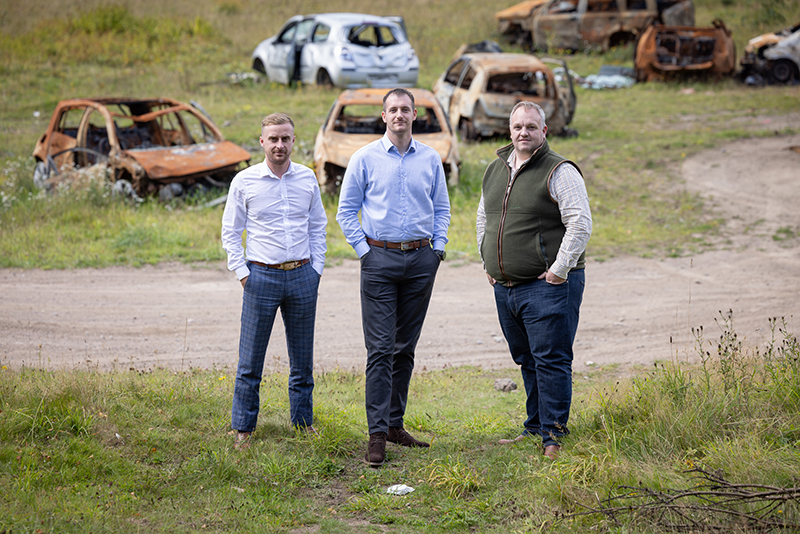
A new Community Interest Company (CIC) has been formed to address critical skills shortages in the Highlands and Islands.
Highlands and Islands Skills, which will be branded Hi-skills, aims to establish an industry-led centre of excellence for skills, safety and innovation in Inverness, redefining how infrastructure, construction, engineering, and renewable energy skills are developed in Scotland.
The vision has already gathered support from Angus MacDonald MP for Inverness, Skye and West Ross-shire, as well as Inverness West Community Council.
Hi-skills is the brainchild of industry leaders Callum Mackintosh, Jack Howell, and Dylan Spink. The University of the Highlands and Islands (UHI) and the Construction Industry Training Board (CITB) are also committed to working in partnership on this initiative, with any new programmes aiming to enhance the training offered in the region and avoid any duplication or displacement.
According to a report published by Highlands and Islands Enterprise (HIE) earlier this year, it is anticipated that, between 2025 and 2040, the Highlands and Islands will see over 250 infrastructure projects backed with investment of over £100 billion. These projects are part of the region’s transition to the green economy with significant developments in pumped storage hydro, wind power, and green hydrogen, and the opportunities presented by the Cromarty Firth Green Freeport status. It is estimated that, at its peak, the region will require 16,000 workers a year.
Hi-skills has identified Torvean Quarry as the best location for the centre of excellence and has initiated the Community Asset Transfer process. This follows unsuccessful attempts to buy or lease the site from The Highland Council.
A £28 million investment is tipped to transform the Highlands through Hi-skills, beginning with a £6.7 million phase one, unlocking training delivery that benefits the economy by £11 million in GVA annually. A further £21 million in phase two will create a centre of excellence for skills, safety and innovation.
Callum Mackintosh, director of Hi-skills, said, “It makes sense to create a national centre of excellence for skills, safety and innovation in Inverness, where we have great road, rail and air links. Inverness is already a hub for renewables and construction, and many high-profile infrastructure projects are due to start on our doorstep such as the ongoing dualling of the A9, Loch Na Cathrach Pumped Storage Hydro, ASTI projects such as the Fort Augustus to Skye OHL, and countless other projects from Campbeltown to Lerwick.
“The Highland Council has also committed to build 24,000 new homes in the region, which will require much the same skilled workforce.
“Torvean Quarry is the perfect location for many reasons. Since 1991 it has sat empty and has inevitably attracted undesirable activity such as anti-social behaviour and fly-tipping. Because it is a former quarry, it is sunken meaning that any development would therefore have minimum visual impact.
“With nearly 40 acres, there is enough land to accommodate multiple indoor workshops and training spaces, but crucially, has sufficient space to provide outdoor training that reflects a realistic working environment for specialist trades such as civil engineering operatives, plant operators, scaffolders and wind turbine technicians.
“Whilst we understand The Highland Council has plans for a Battery Energy Storage System (BESS) on the site, we believe that using the site for a national centre of excellence for skills, safety and innovation has the potential to deliver more long-term economic and place-based benefits, strengthening the reputation of the Highlands as a leader in sustainable development and vocational learning.
“We are pleased to have support from Angus MacDonald MP and Inverness West Community Council, representing the interests of residents close to Torvean Quarry. We also have the backing from leading national and regional training providers as well as the endorsement from regional and national employers struggling with the current skills shortage to make Hi-skills’ vision a reality.
“We are calling on The Highland Council to do the right thing. Every month of delay holds back training, jobs and millions in economic growth for this region. The council has a clear choice: to back a plan that will deliver long-term benefit for our Highland and island communities, or to stand in the way with a BESS development. Hi-skills is ready to move immediately, whether through purchase, lease or community transfer. What matters now is action so that local people and businesses feel the benefits without delay.”
Angus MacDonald, MP for Inverness, Skye and West Ross-shire, said, “The renewables boom has yet to deliver meaningful benefits to the Highlands, either in terms of community investment or local employment. Equipping the local workforce with the skills needed for these jobs would be a major step forward, helping to retain our young people and boosting the local economy. It is unacceptable to bring in external staff, house them in temporary worker camps, and send our young people south to complete their education. Congratulations to Hi-Skills for pursuing such a bold and necessary ambition.”
The proposed centre is expected to remove barriers to apprenticeships, placing nearly 300 apprentices immediately and unlocking the opportunity for 300 additional new apprentice starts annually.
Tim Balcon, CEO of CITB, added, “We have the opportunity to do something really special here. By creating this centre, we are creating a skilled workforce for generations to come. This will ensure that Scotland can deliver on its ambition to be a world leader in infrastructure and construction.”
Hi-skills plans to build the centre in two phases. Phase one will deliver a modular training facility and associated infrastructure to enable early skills delivery aligned with live construction projects and regional demand. This phase will include external workshop areas, classrooms, and practical training zones.
Phase two, the permanent facility, will be constructed during the first three years and once completed, anticipated by 2028, the modular facility can be dismantled and redeployed in smaller parts to other regions as demand grows.
Once up and running, both UHI and the CITB’s National Construction College will use the facility to support further education courses and deliver specialist apprenticeships.











